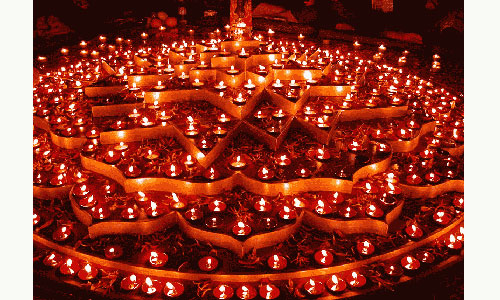
Diwali is also known as the Festival of Lights. The Diwali illuminations with lighted diyas bring the supernatural brightness and joy with the hope of finding light in darkness, achieving knowledge where there is ignorance, and spreading love amidst hatred. Light is significant in Hinduism because it signifies goodness. So, during the Festival of Lights, 'deeps', or oil lamps are burned throughout the day and into the night to ward off darkness and evil as believed by the people.
Traditionally people use 'earthen lamps' with cotton wicks and oil to light up the dark night. As men progress, tradition gives way to modernity. Similarly, earthen lamps have replaced candles of various colors and forms. Electric lights of different shapes and sizes illuminate the dark, cold nights of Diwali.
The idea behind the Festival of Lights comes from various beliefs. In northern parts of India, the tale tells about Lord Rama's return from a twelve-year exile and the celebration by the people for their beloved hero. The pious and rejoicing people decorated their city with candles and lights to welcome him back.
In southern India, the story talks of the Goddess Durga's victory over the evil demon Narakasura. This triumph of good over evil brought back the light of knowledge and truth to mankind.
In the city, Diwali celebrations have become contemporary in keeping with the changing times. Until a decade ago, most city households used to illuminate their houses with the warm, sparkling bright lights of earthen lamps. But now, in addition to these diyas, wax candles of various colors and forms and colored electric bulbs of different shapes and sizes are illuminated soon after dusk.
Those who have a fancy for different types of earthen lamps can opt for handi lamps (earthen lamps shaped as handis or bowls). Some of these handi lamps with the designer touch, with innovative designs glittering and sparkling on them, are sold by a few WOMEN from their home boutiques. Then there are also the star-shaped earthen diyas that hold a large quantity of oil and five wicks in one lamp and are available at roadside stalls. Corners of rooms and puja rooms can be decorated and lighted up with brass, copper or metal lamps.
The oil in the diya represents the dirt (greed, jealousy, hatred, lust etc.) that humans tend to nurture while the cotton wick is symbolic of the ataman (self). So in order to attain enlightenment and unite with the Brahman (the supreme power), one must get rid of materialism. A diya emits light when the wick fueled by oil burns.
Moreover, a Diya also symbolizes knowledge. An ignorant person would often remain in dark and wouldn’t be able to keep a check on the events happening around him. It is only when he feels the need to gain some knowledge that he will realize the purpose of his existence. And hence in this case, a diya/jyot signifies the removal of ignorance through knowledge.
The following mantra in Sanskrit throws light on the path one must adopt to attain peace and it highlights the importance of jyoti (light):
Asato maa sad-gamaya (Lead us from Untruth to Truth)
Tamaso maa jyotir-gamaya (From Darkness to Light)
Mrityor-maa-mritan gamaya (From Death to Immortality)
OM shaanti shaanti shaanti (OM peace, peace peace)
So, a Diya doesn’t merely represent a decorative item but reminds one and all to give up their materialistic desires, defeat their ignorance by gaining knowledge if they wish to merge with God.